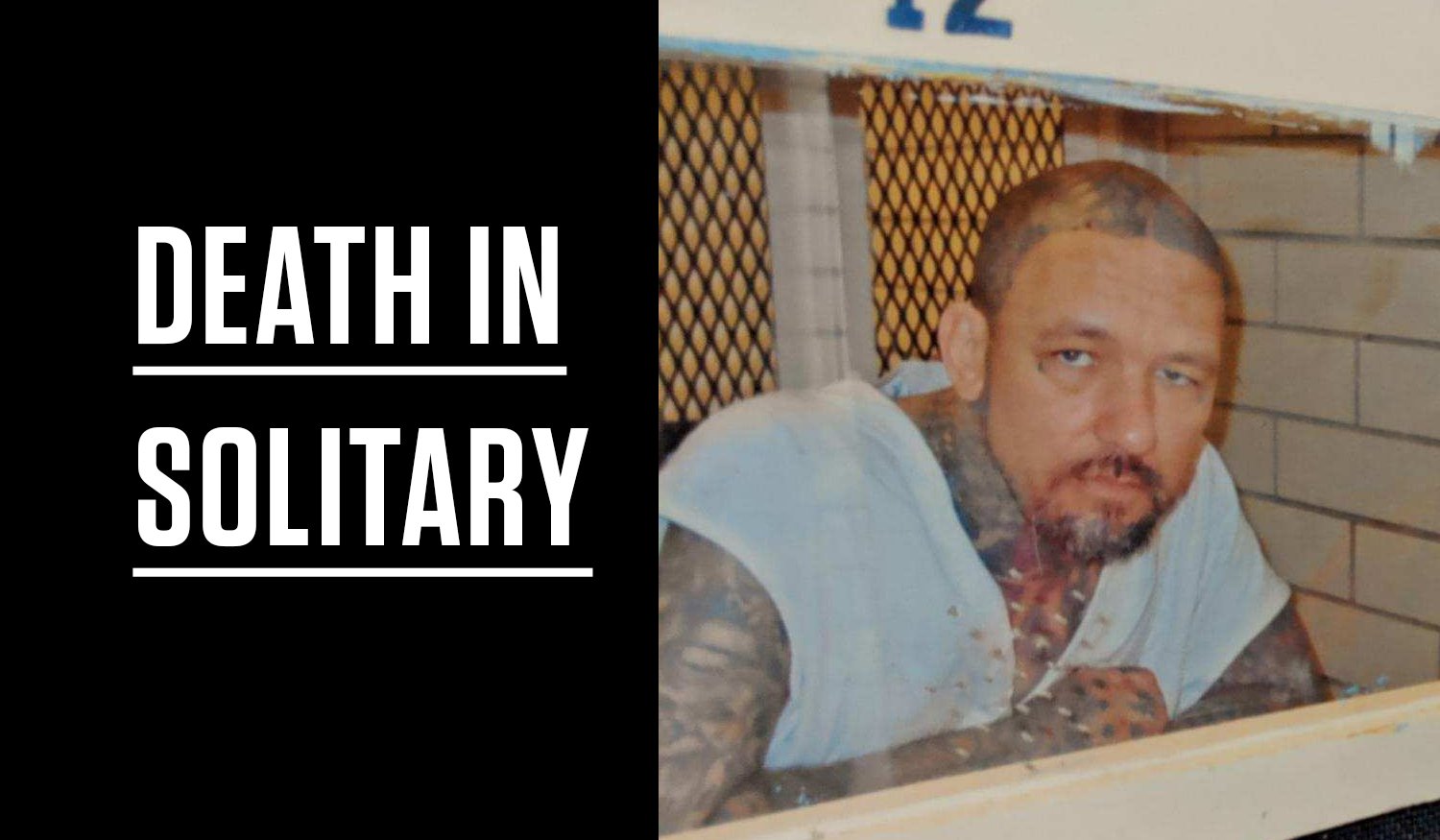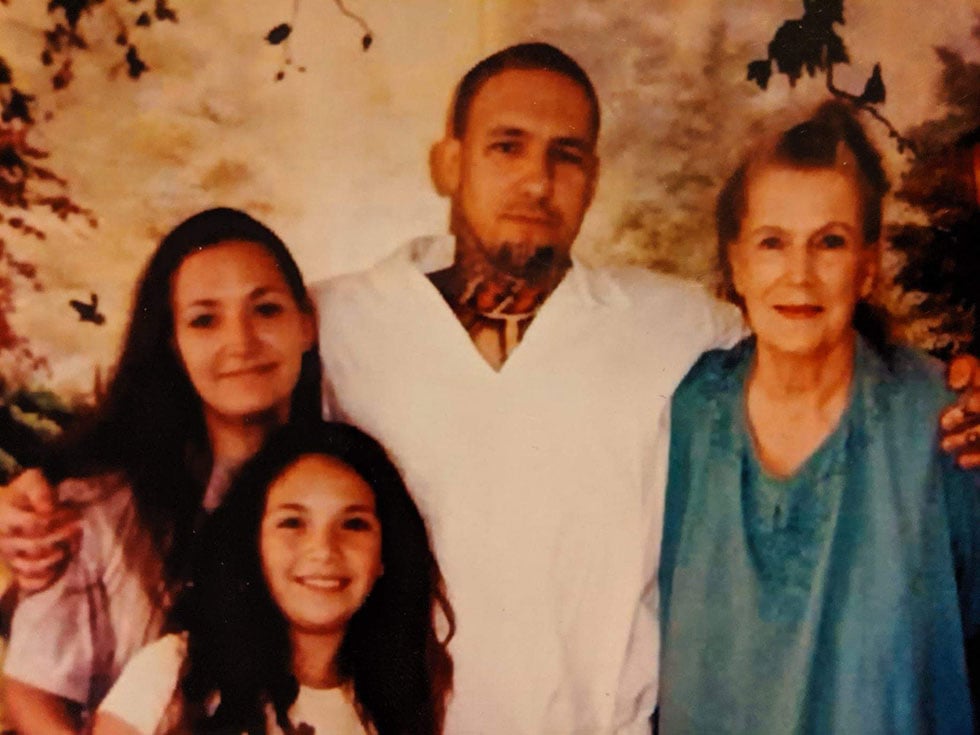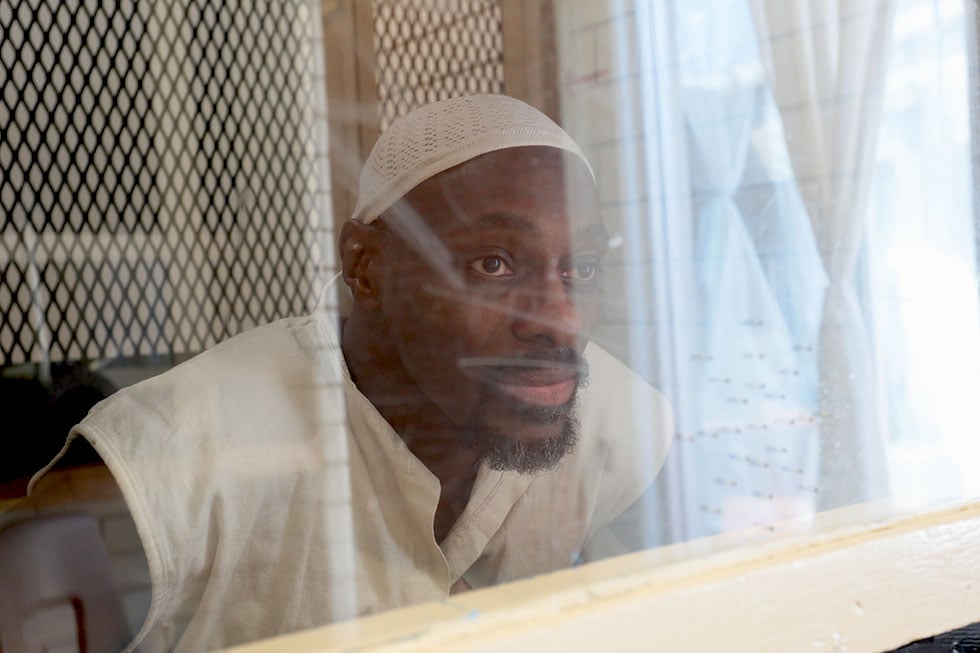
Russell Johnson’s sister warned officials that nearly three years in solitary confinement had broken him. His suicide in isolation two months later points to compounded crises inside Texas prisons.
*
by Michael Barajas
October 9, 2019
On April 28, Tambra Marsh drove three hours from her home west of Fort Worth to the Coffield Unit, a sprawling East Texas prison where her older brother, Russell Johnson, had been living in solitary confinement for the past two and a half years. Sitting in the visitation area, Marsh watched as prison guards escorted Johnson, 38, toward a small pen on the opposite side of a plexiglass divider. Once he was locked inside, Johnson stuck his shackled wrists through a slot in the cage so guards could uncuff him. Then he sat down across from his sister and started to weep.
The tears startled Marsh. She had never seen her brother cry before—not when they were kids nor when he was sent to prison as a teenager, not even during any of the numerous trips to see him in lockup over the previous two decades. Marsh started visiting more often, every other weekend, after Johnson went to solitary for punching a guard in 2016. He deteriorated quickly in isolation, insisting the prison was haunted and saying voices tormented him in his cell. Despite being a few years younger than Johnson, Marsh says she flew into “mamma bear mode” when he broke down during their visit at the end of April: “What happened? Who do I need to call? What’s going on?” she asked him. When he stopped crying, Johnson told her he was just depressed, that he woke up sad every morning. He told her she couldn’t understand what he was going through. “They don’t even treat animals this cruel,” he told her.
The visit disturbed Marsh. When she got home, she wrote to the warden and another state prison administrator, begging them to pull her brother out of isolation. Despite Marsh’s warning that years of solitary had “put more strain on his mental state” and pushed him into a deep depression, officials never moved her brother. Two months later, on the morning of July 6, Johnson killed himself inside a cell about the size of a parking space, where he’d spent 22 to 24 hours every day for 936 days, the final two years and eight months of his life. A report from prison officials documenting Johnson’s death states that guards discovered him in his cell “bleeding from a self-inflicted neck wound.”
Johnson’s suicide in solitary underscores several of the crises straining the Texas prison system. Last year, 40 people died by suicide in the custody of the Texas Department of Criminal Justice (TDCJ)—a 20-year high, according to the Houston Chronicle. Suicide attempts inside Texas prisons have doubled over the past five years. Last month the Texas Observer requested a breakdown of suicides and suicide attempts in isolation, which the agency hasn’t yet provided.
TDCJ’s continued use of solitary confinement appears to exacerbate the problem. Studies have shown higher prevalence of suicide, suicide attempts, and self-harm in solitary than in the general prison population. At last count, 3 percent of Texas prisoners, or about 4,200 of the 145,000 people incarcerated by TDCJ, sit in administrative segregation, or “ad seg,” the agency’s preferred euphemism for solitary confinement. According to the Texas Civil Rights Project, seven of the 35 prisoners who died by suicide in 2017 were housed in isolation. Five suicides inside Texas prisons last year occurred in solitary.
A report the group published last week calls the state’s use of solitary confinement “a barbaric and torturous practice that strips people of their dignity.” According to the new report, as of August 2018, more than 3,000 Texas prisoners had been in isolation for longer than one year. More than 650 had been in solitary for a decade or longer, while 145 had been isolated for more than two decades.
In its report, the organization argues that prisoners should never be isolated for longer than 15 days except in rare circumstances—and even then, never for longer than a year.
Reformers say that the harsh and prolonged nature of solitary confinement in Texas illustrates the need for independent oversight of the state prison system. Jennifer Erschabek, executive director of the Texas Inmate Families Association, says independent monitoring, which is what lawmakers mandated for the state’s scandal-plagued juvenile justice system more than a decade ago, would shine a light on inhumane conditions in solitary and the prison system more generally. “That is the biggest problem with TDCJ, is getting to the truth of the matter,” Erschabek said during a panel on solitary confinement that the Texas Civil Rights Project organized in Houston last week.
Independent oversight would also give families another administrative avenue to turn to if prison officials dismiss complaints that a loved one is wasting away in isolation—or cooking to death inside an uncooled prison during the blistering summer months, or becoming suicidal because they’re not getting their meds.
“It felt like there was nothing I could do,” Marsh told me after her brother’s death this summer. “When they’re in solitary and you see them getting worse, even when you see them losing it, there’s nothing you can do. They just leave them there.”
*
Russell Don Johnson’s last few years in prison were the hardest to endure. In 2015, after more than 17 years in lockup, he made parole and was days away from getting out before an unforeseen setback kept him inside.
Johnson entered the criminal justice system early. Marsh says that Johnson, whose father died when he was 6, started using drugs as a teenager—meth and marijuana in particular—and things quickly spiraled out of control. In 1995, when Johnson was 15 years old, he stabbed another boy with a pair of scissors during a fight outside Mineral Wells High School. According to court records, authorities shipped him to the state juvenile justice system’s maximum security lockup for a year. In 1996, Johnson was sent to, and then promptly expelled from, his school district’s alternative education campus for “profanity, leaving school, arguing with another student and threatening another student.” Later that year, he got into two more fights where he stabbed other kids, first with a screwdriver and the second time with a knife.
The local DA convinced a judge to try Johnson, then 16, as an adult. In 1997, a jury sentenced him to 10 years probation and a yearlong stint at a prison-based drug treatment program. When he was released, Johnson entered a halfway house in Midland that soon kicked him out. Then he failed a drug test. Prosecutors had just filed paperwork to send Johnson, 17 by this point, back to prison when on July 28, 1998, he attacked and robbed an elderly junk store owner, breaking his arm with a pipe wrench.

The first phase of Johnson’s trial four months later didn’t even fill up the whole afternoon. The jury took 38 minutes to convict him of aggravated robbery, which carries a punishment between five and 99 years in prison. During sentencing the following day, then-Palo Pinto County DA Jerry Ray asked jurors to send Johnson, 18, away for at least 40 years, marching a full cast of local police, juvenile justice officials, and school administrators up to the stand to vouch for the teenager’s bad reputation. “Some people demonstrate that they cannot be rehabilitated,” Ray told jurors. “Russell Don Johnson is one of those.”
The attorney appointed to defend Johnson asked jurors to sentence him to between 10 and 15 years. Johnson’s mother, Kathy, was the only defense witness. She was both mournful and resigned to losing her son to prison, but kept repeating his age. “I can’t stand it that he’s done these things, but he’s 18 years old,” she testified. “I know he has to go to prison, I know he has to pay for what he’s done, but he’s 18 years old.”
The jury chose 30 years. Marsh says prison was rough on her brother, especially early on, but they remained close, calling and visiting as often as they could. “As the years went on, he did his time and he tried not to get in trouble,” she said. “He made a life in there. He knew he had a long sentence.”
After spending the majority of his life behind bars, Johnson made parole on June 24, 2015. Marsh says he called her every week during his six-month release program inside prison, talking about his plans for when he got out—which included adopting the oldest, ugliest dog he could find at the animal shelter. When Marsh asked why, Johnson told her that no animal should die alone in a cage. “He just had such plans,” Marsh said. “Half of his life was gone, and he’d had such a rough life. He was so excited about getting out.”
That excitement was abruptly squelched. In January 2016, eight days before Johnson’s sister was scheduled to pick him up at the prison gates, officials reviewed his file and determined that his sentence “had not been calculated correctly.” Under their new math, Johnson would have to spend at least seven more years in prison before parole was possible. Marsh says that giving him the news was devastating. Marsh remembers her brother turning pale as she tried to explain. “He just started rambling off, ‘Call this unit, call this person, call the governor,’” she said. “He was just rambling off places for me to try and get help, to try and fix this.”
Johnson turned to the Texas Court of Criminal Appeals, which dismissed his appeal without comment in October 2016. The following month, Johnson, who, Marsh says, had been stressed, irritable, and losing weight for months, blew up and punched a guard on the rec yard. He pleaded guilty to assaulting a public servant, a third-degree felony, received an additional eight-year sentence, and was sent to solitary confinement.
Marsh says her brother struggled in isolation almost immediately but tried to focus on his federal appeal, which a judge ultimately dismissed last year. She says Johnson began isolating himself even further after that, often refusing to leave his cell for showers or recreation.
Marsh might have reached out to prison administrators sooner, but she says Johnson urged her not to. He worried too many complaints could trigger retaliation. She says he mostly feared winding up in a padded cell or another prison too far away for her to visit. After he broke down crying during their visit this past April, she wrote to officials, “I visit every two weeks, and I see the deterioration of his social skills as his time in ad seg continues.”
The following week, officials told Marsh that her brother had been referred to mental health services and that officials would review his housing status. Johnson was furious the next time Marsh visited, telling her to stop filing complaints. He told her that a counselor stopped by his cell door to ask if he was fine. He waved off the therapist, saying he’d just had a bad visit.
In its recent report, the Texas Civil Rights Project says prison staff often fail to properly screen inmates in solitary for mental health problems. As part of its research, the organization surveyed dozens of Texas prisoners held in isolation. Many of them reported only interacting with mental health providers during check-ins at their cell door that last a minute at most and lack any privacy, during which they’re only asked cursory questions like, “How are you feeling today?”
Marsh felt stuck, worried that complaining not only wouldn’t help but could even further worsen her brother’s mental state. “I was scared to bring it to anyone’s attention again,” she recalled. Johnson eventually stopped writing letters, saying that voices in his cell recited them back to him, mocking whatever he’d just written. “His mind was slipping,” Marsh said.
*
The day after Johnson died by suicide in solitary, Michael Felder wrote to Marsh to offer her his condolences. Felder, 49, is one of more than 750 men held in isolation at the Coffield Unit, which houses more people in solitary than any other Texas prison. Felder, who’s serving a 25-year sentence for a 2005 robbery in Harris County, says he was put in solitary confinement eight years ago—initially, he says, due to allegations of contraband, but subsequent assaults on staff kept him there. Felder says he was housed next to Johnson before he died.
When I wrote to Felder this summer to ask about the conditions Johnson was held in, Felder called Johnson a rare friend in isolation. The average solitary cell in TDCJ is about 60 square feet, about the size of a large walk-in closet or a residential bathroom, although some are as small as 45 square feet. Felder says the noise is inescapable and constant, whether it’s inmates screaming to communicate to each other or banging on their cell doors, bunks, and toilets to get officers’ attention.
Felder suspects that Johnson was hallucinating in his final days, saying he could hear him wake up screaming to himself inside his cell. “It became too much for him to deal with,” Felder wrote back. He says Johnson talked about demons sneaking in and overpowering him. “This is what happens to us who are locked in isolation too long,” Felder wrote. “We become delusional.”

The growing bipartisan consensus around solitary confinement—that it is harmful and massively overused in American jails and prisons—has already pressured Texas officials to change. TDCJ says it has more than halved the total number of inmates in isolation, from more than 9,000 people a decade ago to about 4,200 today.
According to the Texas Civil Rights Project, those who remain in solitary often have serious mental health needs that the prison system fails to address. The majority of inmates in isolation who responded to the group’s survey said they hadn’t received mental health treatment and, not surprisingly, reported deteriorating in solitary. As the Texas Tribune reported earlier this year, some inmates claim the prison system’s program for moving people with mental illness out of isolation subjects them to conditions indistinguishable from solitary confinement. Such programs may even mask the extent to which TDCJ has curtailed the practice, since the agency doesn’t count those participants as being in isolated housing.
Felder says he’s been on psychiatric medication since before he entered prison, and he claims that treatment in solitary has ranged from sporadic to nonexistent. In one letter, Felder referenced a man the same age as Johnson who Felder says killed himself in solitary at the Coffield Unit in March. An agency report calls the death a suicide, but doesn’t state whether the man died in isolation. “Every in custody death is investigated by the Independent Office of Inspector General,” TDCJ spokesperson Jeremy Desel said in a statement. TDCJ didn’t answer specific questions about that case or Johnson’s death, nor did the agency respond to any of the questions I submitted in recent weeks regarding its use of solitary confinement and the criticisms in TCRP’s report.
I recently went to Coffield to visit Felder. Guards escorted him into a cage at the visitors’ area, where we had to nearly shout to hear each other through small air holes in the plexiglass that divided us. Felder’s voice sounded raspy, like he’d gone hoarse from yelling. He insisted that prolonged isolation is a cruel and inhumane form of punishment. “It causes you to break down emotionally, mentally, and physically,” he said. “The longer you stay back here, the harder it is.”
Read more from the Observer:
-
No Exit: Under Texas’ harsh sentencing laws, people convicted of relatively minor crimes—such as stealing a sandwich—can get life in prison.
-
Attacked in Mexico, Returned to Mexico: Trump Policy Ignores Danger to Asylum-Seekers: The Migrant Protection Protocols are failing to protect migrants from imminent kidnapping and violence.
-
In Texas, 3 Out of 4 County Jail Inmates Haven’t Been Convicted of a Crime: Pretrial detainees—legally innocent people who have been charged but not convicted of a crime—now occupy more beds in jails than any other group..







